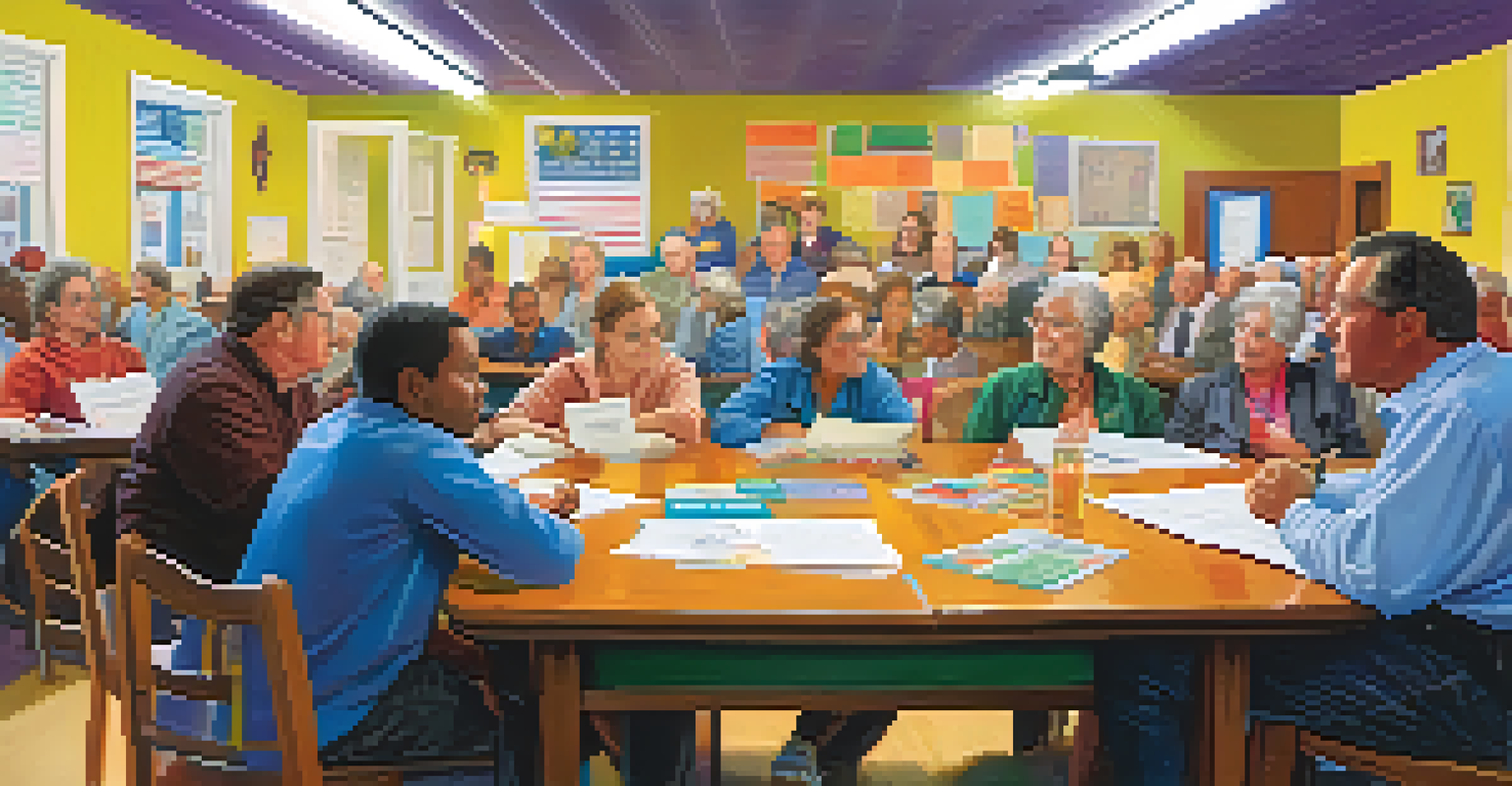Key Issues Driving Political Debates in Kansas

Abortion Rights: A Heated Topic in Kansas Politics
Abortion rights have emerged as a pivotal issue in Kansas, especially after the Supreme Court's decision to overturn Roe v. Wade. This shift has galvanized both pro-choice and pro-life advocates, leading to intense debates during election cycles. Voters are increasingly concerned about the implications of local legislation and ballot measures regarding reproductive rights.
The rights of women are not just a matter of personal choice; they are a matter of public policy that affects all aspects of society.
In recent elections, Kansas residents faced a referendum that aimed to remove abortion rights from the state constitution. This brought passionate discussions to kitchen tables throughout the state, as families weighed the moral, ethical, and practical implications of such a decision. As a result, the topic has not only dominated political campaign agendas but also influenced voter turnout.
The ongoing debates around abortion rights reflect broader national trends, yet they showcase the unique cultural landscape of Kansas. With stories of personal experiences emerging, the conversations are becoming more humanized, prompting voters to consider how legislation affects real lives.
Education Funding: A Critical Concern for Kansas Families
Education funding is another key issue that consistently sparks debate among Kansas residents. Over the years, various court decisions have underscored the need for adequate funding to support public education, which many argue is essential for the state's future workforce. Parents, educators, and policymakers are increasingly vocal about the urgent need to address disparities in funding, particularly in under-resourced districts.

In discussions about education, issues such as teacher salaries, classroom sizes, and access to technology frequently arise. The debate often centers on how to balance budget constraints with the imperative of providing quality education. As Kansas grapples with these challenges, the public's engagement in school board meetings and state-level discussions has grown significantly.
Abortion Rights Fuel Political Debate
The overturning of Roe v. Wade has intensified discussions on abortion rights in Kansas, influencing both voter turnout and political agendas.
Moreover, the impact of education funding extends beyond the classroom. It influences economic development, community stability, and the overall quality of life in Kansas. As families advocate for better educational opportunities, this issue is likely to remain a focal point in political debates.
Healthcare Access: A Divisive Political Issue
Access to healthcare remains a contentious issue in Kansas, particularly following the COVID-19 pandemic. Many residents are concerned about the availability of affordable healthcare services, especially in rural areas where hospitals have closed or scaled back services. This has led to a growing demand for solutions that expand access and improve health outcomes for all Kansans.
Education is the most powerful weapon which you can use to change the world.
The debate often includes discussions about Medicaid expansion, which supporters argue would provide coverage to thousands of uninsured residents. Opponents, however, raise concerns about the potential costs and implications for the state budget. As legislators weigh these competing interests, healthcare continues to be a critical issue for voters, especially those facing economic hardships.
Personal stories about healthcare struggles resonate deeply within communities, fueling activism and advocacy. As more Kansans share their experiences, they contribute to a larger narrative that emphasizes the need for systemic change in the healthcare landscape.
Economic Development: Jobs and Growth on the Agenda
Economic development is always at the forefront of political discussions in Kansas. With a diverse economy that includes agriculture, manufacturing, and technology, residents are eager to see policies that foster job creation and attract new businesses. The challenge lies in balancing growth with the need to support existing local enterprises and workers.
Candidates often propose various strategies to stimulate economic growth, from tax incentives for businesses to investments in infrastructure. The effectiveness of these proposals is frequently debated, as constituents seek assurances that they will lead to tangible benefits for their communities. Moreover, the conversation includes discussions about workforce development and the skills training necessary for the jobs of the future.
Education Funding Sparks Urgency
Disparities in education funding continue to provoke strong advocacy among Kansas families for more equitable resources and support.
As voters consider the economic outlook, they are increasingly interested in how local policies can create sustainable job opportunities. The desire for a thriving economy drives engagement and shapes electoral choices, making it a vital issue in Kansas politics.
Voting Rights: Ensuring Fair Access for All
Voting rights have become an essential topic in Kansas, particularly amid national conversations about election integrity and access. Recent legislative changes have raised concerns among voters about potential barriers to casting ballots, especially for marginalized communities. This has led to heightened awareness and activism around the importance of fair voting practices.
Kansas has seen various proposals aimed at reforming voting processes, including discussions on voter ID laws and mail-in voting. Supporters argue these measures enhance security, while critics contend they disproportionately affect low-income and minority voters. As the debates unfold, many Kansans are advocating for solutions that ensure every eligible voter has the opportunity to participate in elections.
The push for equitable voting access is part of a broader movement to empower citizens and strengthen democracy. As grassroots organizations mobilize to educate voters about their rights, the issue of voting rights remains a significant driver of political conversation in the state.
Climate Change: A Growing Concern for Kansas Residents
Climate change is becoming an increasingly important issue for many Kansans, particularly given the state's agricultural roots. Farmers are feeling the effects of changing weather patterns, which impact crop yields and livestock health. As residents witness more frequent and severe weather events, discussions about climate resilience and sustainable practices are gaining traction.
Political debates often center around renewable energy initiatives, such as wind and solar power, which Kansas has the potential to harness effectively. Advocates argue that investing in renewable energy not only addresses climate concerns but also creates jobs and stimulates economic growth. However, some political factions remain resistant, citing concerns about costs and feasibility.
Healthcare Access Remains Contentious
Access to affordable healthcare is a critical issue in Kansas, especially post-pandemic, with ongoing debates about Medicaid expansion and health service availability.
As the conversation evolves, more Kansans are recognizing the need for proactive measures to address environmental challenges. This growing awareness is pushing climate change to the forefront of political debates, influencing policy proposals and voter priorities.
Gun Control: Navigating a Polarizing Debate
Gun control is a highly polarizing issue in Kansas, where a strong culture of gun ownership exists. Recent events have reignited discussions about gun laws, with advocates calling for stricter regulations to ensure safety, while opponents emphasize the importance of protecting Second Amendment rights. This contentious debate often plays out in both legislative chambers and community forums.
Many Kansans have personal stories related to gun ownership, whether about hunting traditions or concerns over safety. This emotional connection to the issue complicates discussions, as both sides seek to find common ground. The challenge lies in addressing public safety concerns while respecting the rights of responsible gun owners.

As more residents engage in conversations about gun control, the demand for balanced solutions is growing. Voters are increasingly looking for candidates who can navigate this complex issue in a way that prioritizes safety without infringing on personal freedoms.